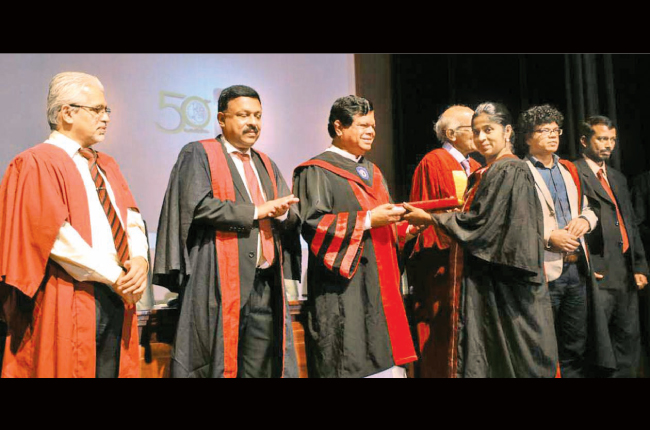The 50th-anniversary celebration of the Sri Lanka Press Council was held in Colombo under the patronage of Transport, Highways and Mass Media Minister Dr. Bandula Gunawardhana.
In conjunction with the anniversary, many programmes were implemented including the release of the book Madhya Sameeksha – V, the certificate awarding ceremony of the ninth group of the Diploma Course in Journalism and the distribution of publications for the children of low-income journalists, and the evaluation of the staff of the Sri Lanka Press Council.
The keynote address of the programme titled ‘Media Progress and Technology: New Trends’ was delivered by Professor Dinesh Samarasinghe, Dean of the Faculty of Business, University of Moratuwa.
Minister Dr. Bandula Gunawardhana expressed the following views addressing the meeting:
“Like all other countries, Sri Lanka’s newspapers have a great responsibility in the present time. When we were students, newspapers were seen as a university. Lake House, which was considered the home of newspapers in this country, was responsible for the country’s independence and then for creating social, economic, political and cultural development through a great ideological contribution. At that time, the leading positions of Lake House were held by great personalities.
“Authors like Martin Wickramasinghe gave great guidance to society through their writings. Newspapers at that time played a great role in disseminating knowledge throughout the country in three languages of Sinhala, Tamil and English. Apart from the main universities in the country, the newspaper and radio also served as universities. A staff with good understanding of the relevant subjects were employed in those institutions and they led to reaching such a situation.
“The main national problem in the country is that we don’t have enough money. My problem as the Minister in charge of Highways is that we don’t have enough money to develop the dilapidated roads. All the development work done so far has been done with foreign loans and aid. At present, we are not getting any loan or aid money. Until the debt is restructured, no matter whoever forms the Government, it is not possible to get any loan. Simply printing money is not a solution to this problem. No Government has enough revenue to meet recurrent expenditures including salaries, pensions and subsidies, and interest on loans.
“Has there been a discussion in the media about whether there is a way to change this situation by making a political change? If the economic truth about this is announced, there will be a big public protest. People who do not have a subjective understanding of this will suppress the truth and distort the facts in the media. I also experienced the outcome of it.
“During my tenure as the Minister of Education, an amount of Rs. 83 per day was allocated for food and other necessities for students in Colleges of Education. That was Rs. 2,500 per month. Accordingly, Rs. 2,500 was enough to sustain the life of people, but I submitted a paper to the Cabinet asking to increase it by another Rs. 500. I told this to the media and from then till now, all the media reported that I had stated that one could live on Rs. 2,500. Eventually, that is what the people who came to set my house on fire also said.
“On no day in history have I ever used a minister’s official residence. I have not taken house rent, electricity bills and water bills. I have not withdrawn salaries. I have not been involved in stealing or taking commissions. Social hatred was created by the media up to burning the assets I earned as a teacher. The fake news that I said one could live on Rs. 2,500 affected me and my family in that way.
“It is extremely important for all those who work as journalists to use the media with humanity and compassion. It is not fair to work with hatred and believe that only what they know is right.
“Therefore, the new generation of young people who join the media should read more and study. I believe that a multilingual group must lead the media.
“We are a nation that has had to experience the unpleasant sound of clashing iron, the unpleasant smell of iron, sadness and pain in the hatred created by races, religions, castes and classes for decades. I believe that the media should be more prudent and enlightened to heal the nation. In some cases, some even raised allegations before the Geneva Human Rights Commission, carrying the opinion that a Tamil genocide had been carried out instead of a humanitarian operation. In some cases, instead of a humanitarian operation, it was reported as a massacre.
“The Newspaper film we produced regarding the tragedies in the lives of individuals caused by the misuse of media was awarded and appreciated both locally and abroad. If we can comprehend more than we think, see more than we look, and listen more than we hear, we can give the world something new and creative and win the world.”
Secretary of Media Ministry Anusha Palpita, Sri Lanka Press Council Chairman Mahinda Pathirana, Press Commissioner Niroshana Tambavita, Course Coordinator Emeritus Professor Sunanda Mahendra, former Presidents of the Press Council and a large number of former officials were present.







